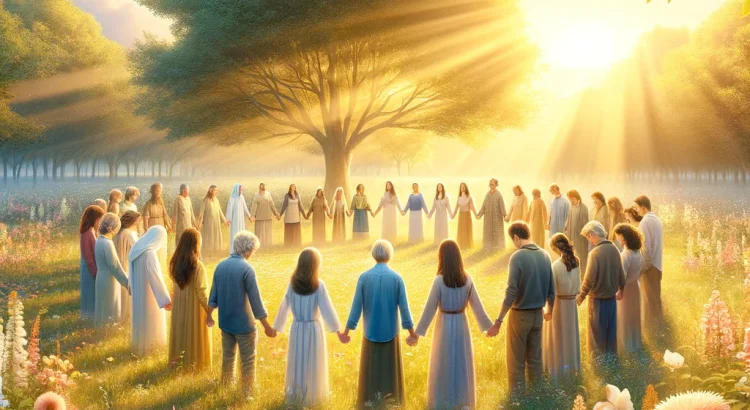By George D. Watson (1845 – 1923)
The first and great commandment, Jesus said, is to love the Lord our God with all our heart and soul and mind and strength (Matt. 22:38; Mark 12:30). No individual can live a truly peaceful, happy, and useful life, without being regenerated and sanctified and loving his Creator with all his heart. Only a small proportion of men have been willing to submit perfectly to the very law which is conducive to their highest good.
If the sons of men would from the heart keep the first commandment, think what heavenly changes would pass over the face of the world! Thinking upon this helps us to get a larger view of who God is, of what His Word is, and of what His love is. Consider that one single short commandment – “…Thou shalt love the Lord thy God with all thine heart, and with all thy soul, and with all thy might” (Deut. 6:5) – has enough in it to turn this almost demonized world into a veritable paradise.
If it had not been that our souls have been degraded by sin, God would never have had to command us to love Him. Except for sin, we would see it as a blissful privilege to love our God. It is sin that has necessitated the giving of a law. When we are properly enlightened, the loving of God with all the heart is the sweetest joy in all creation, and if we only knew enough about who God is and what He is to us, we would be on our knees imploring Him for the privilege of loving Him all we wanted.
The reason so few people love God is because they do not have in them by nature the kind of love to love Him with. God can only be truly loved with His own love. We must have divine love imparted into our hearts by the operation of the Holy Spirit before we can truly and scripturally love God.
There are two words in the Greek Testament for love. One word, “philos,” signifies any natural human affection, which all men have. The other word, “agape,” signifies divine love, the feelings and character of God. Just as we get human affection by our natural birth, so we get the divine love by our spiritual birth into the kingdom of God. Even after divine love has been imparted to us, we need to be sanctified, and baptized with the Holy Ghost and fire, in order to give this divine love perfect liberty and ample sweep through all our capacities. Following are seven phases of love which we can return to our blessed Creator and Redeemer for His love to us.
1. Grateful Love
The love of gratitude is one of the first forms of divine love that springs up in the newly converted heart. The love of gratitude is filled with thanksgiving. It sings that sweet song of love uttered by Jesus, “I thank Thee, O Father…because Thou hast hid these things from the wise and prudent, and hast revealed them unto babes” (Matt. 11:25). It takes a timbrel, and joins Miriam in her joyful song, after crossing the Red Sea, that God has triumphed, and that the enemy is overthrown in the sea (Ex. 15:20-21). It sings with Hannah at the dedication of little Samuel, to the Lord that “raiseth up the poor out of the dust…to set them among princes, and to make them inherit the throne of glory…” (1 Sam. 2:8).
The love of gratitude delights in counting over the mercies of God in the past, and turns them over and over in fond recollection, like a miser counts his gold, yet with the very opposite spirit of the miser, for it is unselfish praise to the Giver of all good. The love of gratitude, like Mary (Luke 2:19), ponders things in its heart that others think lightly of, and appreciates what others would call little blessings, trifling mercies, insignificant answers to prayer. Grateful love sees the magnitude of God in a thousand little things unnoticed by those who have not yet learned to look through eyes of love.
This phase of love is very humble, and full of the spirit of repentance, and meek submission, and feels unworthy of so much divine goodness. It measures all its blessings by the preciousness of the Hand that bestows them. Love of gratitude is forever sending up to God the sweet incense of thankfulness and says many times a day, “Thank You, Father!”
2. Elective Love
Elective love of God is that by which we compare Him with all other beings in creation, and contrast the superiority of God to all other beings, and the excellence of His ways, His authority, His care, His compassion, His mercies, above and beyond all the creatures with which we are acquainted. It is this form of loving God that shows us more clearly the emptiness, the deceitfulness, the passing value of everything that seems good in the world.
It is this elective love by which we compare our God with angels and saints and our common fellow creatures, and then choose God over and above all others, as we would choose a diamond in preference to a lump of clay, and rejoice in the more excellent treasure. Elective love disregards all that would intrude to take the place of God or would in the least way share our hearts with Him. It is this love by which we elect the living God and spurn all other gods and all false prophets, and all false religions. Our hearts burn with indignation against anything that would attempt to usurp the place of God, or to share in the least the honor and praise due only to the Lord.
It is this elective love that Peter refers to when he tells us to “sanctify the Lord God in your hearts” (1 Pet. 3:15), that is, give God His rightful place in our hearts and in everything. It is this elective love by which we dash every idol, and snap every tie, and turn from any pursuit, and break any friendship and spurn any earthly honor or any churchly ambition that interferes with the claims of God and with our loving Him and obeying Him to the uttermost. By elective love we extol the sovereignty of God and cast aside everything that comes in competition with His glory. It crowns Christ Lord of all. Detachment of spirit from the things of earth is the special fruit of this kind of love.
3. Complacent Love
This is the kind of love which is peacefully contented and satisfied with God, and delights in all His blessed perfections. This is the kind of love referred to by the psalmist: “Whom have I in heaven but Thee? and there is none upon earth that I desire besides Thee” (Psa. 73:25). It is what Solomon sings about when he says of the divine Bridegroom: “[He is] the chiefest among ten thousand” and the one “altogether lovely” (Song 5:10, 16). The love of complacence loves God because of Himself alone, because it perceives the eternal beauty of His nature, the sweetness of His character, the indescribable greatness of His attributes, the delicacy and charm of all His perfections.
The soul seldom gets into this form of loving God for His own infinite blessedness until it is deeply sanctified and illuminated by the indwelling of the Holy Spirit. Blessed are the pure in heart, because they shall see, even in this life of faith, the blessedness of the character and person of God. While elective love looks at other beings in contrast to their nothingness with God, on the other hand, complacent love is so sweetly taken up with God Himself, and so satisfied with His perfections that it seems to forget other things and people because the purity and presence of God fills the entire horizon as though nothing else was visible.
The love of complacence rejoices that God is just what He is, and that He never can change. It fairly dances with delight that there never will be to all eternity any other God. As it looks out over the endless future, not the least shadow of change will ever pass over the allradiant character of God. What God is to us now He will be in endless ages. Complacent love finds a secret delight in all the attributes of God, and admires the way He does things, and reposes with unspeakable peace upon the character of God.
4. The Love of Desire
By this form of love we thirst and long after God. This is the kind of love David felt when he said: “One thing have I desired of the Lord, that will I seek after…to behold the beauty of the Lord, and to inquire in His temple” (Psa. 27:4). Again, his desire after God led him to say: “As the hart panteth after the water brooks, so panteth my soul after Thee, O God” (Psa. 42:1).
There are three kinds or degrees of spiritual thirst: the first is for pardon, the second is for purity, and the third is for the fullness of the living God Himself. To properly desire God, the heart must be in a condition to appreciate Him, to have a congenial union with Him, and to enjoy the traits of His character. It would seem that Daniel had this love of desire for God in an eminent degree. Where we read that the angel told Daniel he was a man “greatly beloved,” the margin reads that he was a man “of desire” (Dan. 9:23). That is, he was a man of intense longings after God. No one can be a Christian without a true heart hunger after God, but there are countless forms and degrees of this desire in different souls.
It is love of desire that draws the soul out to know God in His three divine persons, to know His communion, and to be filled with each attribute and perfection in the divine nature. Nothing in all creation can satisfy our immortal spirits, but the living God Himself. It is this sweet pain of thirst for God that draws us to secret prayer, to study what God is, to neglect other things as trifles that we may win the light of His face and the flow of His Spirit. It is the intensity of this desire for God that pulls hearts out of mere ordinary religion, and entices them to climb the steeps of true holiness where they can rest on the upper summits of the mountains of grace, where the day breaks soonest in the morning, and where the mellow light of evening lingers the longest.
What a beautiful sight it would be if we could look through creation and see how this strong desire for all the beauty of God was seizing on many hearts, and drawing them, some slowly and others swiftly, but steadily and surely drawing them. It draws over land and sea, over mountains and vales, over lonely and thorny paths, through a thousand difficulties, toward that beautiful day when they will rest with rapture in the glory of God. All things apart from God sooner or later weary us. He alone is forever fresh, and to loving hearts He is always like a new discovery to the eye.
5. Sympathetic Love
It is by this kind of love that we feel for God and support His interests and become intensely jealous for His honor and glory. The Greek word for “sympathy” means to “suffer with,” to take partnership in feeling the injuries and wrongs done to another. It is this love of sympathy that feels keenly the insults that wicked men and demons offer to God. It is this kind of love that David felt burning like a fire in his heart when he said: “Do not I hate them, O Lord, that hate Thee?…I hate them with perfect hatred…” (Psa. 139:21-22).
It is this love that cannot bear to hear God’s name taken in vain, to hear His Word denied or trifled with, to see the Lord’s Day degraded and to hear His blessed character criticized or caricatured. It feels like weeping over the way God is neglected, left unloved, unthanked, untrusted, and unappreciated by God’s creatures. This is the kind of love that burns like a furnace in the heart of reformers when they clad themselves in zeal like a coat of mail and thunder at wickedness in church or state, and put their lives in jeopardy. They would rather die than to see their blessed God insulted and trampled upon.
It is this kind of love for God that sees His interests everywhere, and is keenly sensitive to His rights and His honor in all things. It is this beautiful, hot jealousy for the glory of God that cannot bear false Christs or false prophets. This love of divine sympathy is very prompt and wide-awake and can detect false doctrine and gross infidelity where others see no harm. It is this kind of love that makes heroes and martyrs. It is always sorry for sin, and sorry that God is not loved enough.
6. Benevolent Love for God
This is the overflow, the surplus as it were of love, by which the soul wishes that God may have all the praise and the glory and the happiness which it is possible for Him to have. It wishes it could in some way be a blessing and a benefit to God, although it is conscious that it is nothing, and that God is so perfect that nothing can be added to His infinite happiness and blessedness. It congratulates God on all His blessedness and His possessions and wishes that they could be increased if that were possible.
We must remember that God has two kinds of glory: first, the glory that is inherent inside the divine nature, and then the glory that is external to God in His creation of worlds and creatures. The glory that resides inside the divine nature, consists in His natural perfections, in His eternity, His sanctity, the communion of the three divine persons, and the infinite joy which He has in Himself. The external glory of God consists in the magnitude, the variety, and the splendor of created worlds and the various ranks of angels, men and the lower orders of creatures.
Added to this is the glory which He obtains by redeeming fallen men by the systems of grace, of providence, of rewards and punishments, of the application of His mercy and justice to His creatures, and the praises, the love, and the worship that are rendered back to Him from His creatures. It is impossible for God’s inherent glory in His own blessed Self to ever be increased. But His external glory can be ever widening in extent and increasing in luster, from the application of His grace and truth to His creatures. This is the field over which man’s benevolent love for God spreads itself, and is always wanting God to reap larger harvests of praise and glory from creation.
7. Adoring Love
It is this kind of love for God that worships and adores and gazes with fond delight, lost in wonder, love and praise. This kind of love sits in silence and contemplates God with a sacred awe and a deep passive appreciation of Himself. It does not stop to search into the separate attributes of God, which is the pleasing task of meditation, but it sees as it were all the perfections of God merged into one ocean of spotless white, of serene, unruffled majesty and glory. Adoring love is the culmination of all other kinds of love.
To worship God is more than prayer or theology or law or duty or service or faith. It is a supreme delight in God. In adoring love, the soul basks in His light, smiles at His favor, sweetly trembles at His majesty, is charmed with His beauty, drinks in His sweetness, and finds no words adequate for praise, but just to look, and wonder, and hold its breath, and admire, and love, and wish for ten thousand hearts to love Him more and more.
These are seven forms of love, seven colors in the rainbow of our affection for God which we can hang around the neck of our dear Savior, and in Him and through Him, lay at the feet of our own God, our dear Father, our precious Jesus, and our blessed Comforter, the Holy Ghost.
– Arranged from Our Own God by George D. Watson.










